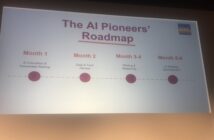Soft skills development is the top priority for organisational learning in the coming year, according to a new study by learning content provider Video Arts.
Of 292 learning and development professionals questioned, 63% claimed that their number one priority for the next 12 months was to develop soft skills – the skills that relate to a person’s ability to interact effectively with others.
The second priority was leadership training, which had consistently been ranked as the top priority since 2009 in similar surveys by Video Arts. Other key areas of focus for L&D are customer service training, professional skills development and compliance training.
Respondents were also asked how they currently deliver training and how they plan to develop their plans for the future. Face-to-face training is widely used, with 81% of organisations using classroom learning. E-learning (79%), coaching (72%) and experiential learning (53%) also remain popular.
Usage of newer forms of delivery are growing with virtual classrooms being used by 27% of respondents and mobile learning by 12%.
Some 64% of organisations plan to increase their provision of coaching over the next two years and 55% will offer more learning through virtual classrooms and 55% will provide more experiential learning.
According to the survey, elearning is being used to deliver the following forms of content:
- Soft skills development (51%)
- Compliance training (53%)
- Health and safety training (47%)
- Leadership and management training (42%)
- Induction training (42%)
- Professional skills training (34%)
- Customer service training (37%)
Video Arts CEO Martin Addison said, “Leadership development has been the top priority in our survey for the past three years, as many organisations have believed that the secret of greater success lies in more effective leadership. This year it has been pushed into second place as L&D teams are increasingly recognising that technical qualifications and knowledge are not enough; employees also need soft skills for organisations to be successful.
“Issues of personality, attitude and behaviour have a big impact on performance in the workplace because they affect how well people are able to communicate face-to-face and work effectively with others,” he added.
- See the full press release.
[Picture credit: Rafael Marchesini]




